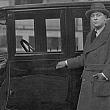The Detroit Episode and Henry Ford
by Francis Gloyd Awalt
Sometime in 1930 a drain approaching the proportions of a run began on the large banks in Detroit. In a period of about two and one-half years prior to February 11, 1933, about $250,000,000 was withdrawn from the First National Bank of Detroit, and large sums were also withdrawn from the Union Guardian Trust Company and the Guardian National Bank of Commerce. In order to meet these withdrawals, the First National Bank was compelled to liquidate practically all of its liquid and unpledged assets, and the Union Guardian Trust Company was compelled to borrow from the Reconstruction Finance Corporation (RFC) and from the Ford interests. Mr. Edsel Ford was Chairman of the Board of the Union Guardian Group.
In January 1933, the run was continuing without abatement, and the Detroit banks were losing from $2,500,000 to $3,000,000 each week. The banks could not continue to pay out money at this rate without further borrowing.
The Guardian Trust Company attempted to borrow further funds from the RFC. In order to accomplish this, Henry Ford was asked to subordinate some of the amount owed to the Ford interests to a new loan. He refused to do this, and it seemed obvious that, if the Guardian Trust Company could not meet withdrawals, a chain reaction would occur in the group and spread. It was thought wise to send someone high in the administration to Detroit to confer with Ford. Those chosen were Arthur A. Ballantine, Under Secretary of the Treasury, and Roy D. Chapin, Secretary of Commerce. A meeting was arranged with Ford by President Herbert Hoover.
 The Ford interests had on deposit $7,500,000 at the Guardian Trust Company, about $17,500,000 at the Guardian National Bank of Commerce, and about $25,000,000 at the First National Bank of Detroit. Secretary Chapin and Mr. Ballantine met with Mr. Henry Ford, Mr. Edsel Ford, and Mr. E.G. Leibold in Mr. Ford’s office at Dearborn at 10:00 A.M. February 13, 1933. This was a legal and a banking holiday since Lincoln’s birthday fell on Sunday, February 12.
The Ford interests had on deposit $7,500,000 at the Guardian Trust Company, about $17,500,000 at the Guardian National Bank of Commerce, and about $25,000,000 at the First National Bank of Detroit. Secretary Chapin and Mr. Ballantine met with Mr. Henry Ford, Mr. Edsel Ford, and Mr. E.G. Leibold in Mr. Ford’s office at Dearborn at 10:00 A.M. February 13, 1933. This was a legal and a banking holiday since Lincoln’s birthday fell on Sunday, February 12.
According to the signed report of Secretary Chapin and Mr. Ballantine, Mr. Ballantine stated they were there to discuss the acute situation existing with reference to the Union Guardian Trust Company of Detroit and a plan which had been worked out to enable the trust company to remain open. Mr. Henry Ford stated at once that he knew about the plan and that he would not agree to do what he understood had been proposed he do, but that he would be glad to discuss the situation.
As part of the transaction the deposit liabilities of the Union Guardian Trust Company would be assumed by the Guardian National Bank of Commerce, which would receive from the trust company cash assets to make good the liabilities so assumed. Ballantime pointed out that this plan had been formulated on the basis that the deposit liabilities of the trust company to the Ford Company, in the amount of $7,500,000, would be subordinated and that, in addition, part of the new cash required would have to be supplied by the Ford interests. He said that those having given consideration to the plan felt that so worked out, it would enable the trust company to continue as a trust company and the Guardian Group to continue its banking activities.
Mr. Ford stated at once that he would not subordinate the $7,500,000 deposit liabilities held by the Ford Motor Company. He stated that he had said some two or three weeks earlier that this might be done, but he had not fully understood the plan. In any case, his determination was that he had changed his mind and that he would not do this.
Mr. Ballantine stated to Mr. Ford that his decision would make any plan for saving the trust company impossible. He further stated that, if the trust company could not be saved, it was the opinion of those who had considered the situation that the Guardian banks would be forced to close. The consequences of this would be to throw great pressure upon the First National Group and upon all the other banks in Michigan, and that pressure would probably very soon extend outside of the state.
Mr. Ford reiterated that he would not agree to make the subordination of the Ford deposits in the trust company. He further stated that if the trust company was not kept open, he would immediately, on Tuesday morning, withdraw from the First Nation Bank the Ford deposits of $25,000,000. Mr. Ballantine asked whether he had understood Mr. Ford correctly. Mr. Ford said that he had, and that Mr. Ballantine was free to immediately report his position to the RFC and those working in Washington in connection with this situation.
Mr. Ballantine then stated that it seemed clear that the Guardian Group could not survive, that the withdrawal of the Ford account from the First National Bank of Detroit would make it very much more difficult to preserve that bank, and that if that bank could not survive, it was difficult to see how any Michigan banks could be kept open. This, he stated, would cause vast distress in the State of Michigan as there were nearly 1,000,000 bank depositors representing the source of support of as many as 3,000,000 people. All these people would be subject to loss and suffering, and the business of the state would be vastly hampered, if not paralyzed.
[Mr. Chapin] said that it was very hard for him, as a manufacturer (Hudson Motors), to contemplate such a development and that he could not see how Mr. Ford could possibly want to face such a situation.
Mr. Ford said that great adverse financial development might have a very bad effect upon the industry but that, even if the effect were so bad that his company would be destroyed, he would proceed to start a new one and believed that he could again build up a business, as he still felt young. Mr. Chapin then spoke to Mr. Ford about the immediate effect upon the local situation, saying that he believed that Mr. Ford must feel a deep interest in the future of Detroit and its people. It would seem a very strange thing for Mr. Ford, in effect, to turn his back on the course which he had pursued and fail to help stave off the threatened adversity.
Mr. Ford said that the people here, and all people, might have to go through the experience of a crash. The general effect would be that everybody would have to get to work a little sooner, and that might be a very good thing. In any event, it had to come. There were further pleas made to Mr. Ford, but he said that he would not subordinate, or in any way contribute, a single dime, as he felt that the principle was wrong. He stated that he felt he had already done everything he should to help the trust company.
Mr. Ford stuck to the point that the crash had to come and stated that the only terms on which he would subordinate his deposits to the trust company would be to receive from them endorsed notes which would be absolutely good. Mr. Chapin remarked that Mr. Ford always claimed the right to change his mind, and he hoped he would think over most carefully all they had said and let them know if there was any change that day. Mr. Ford remarked that the trust company was dead anyhow. Mr. Chapin said that Mr. Ford should reflect on the point that the corpse might communicate disease over a very extensive area.
Governor William A. Comstock declared a banking holiday for Michigan about 1:00A.M., February 14, after the request for such a holiday was placed in writing. The holiday declared was for a period of only eight days, but it was later continued up to the date of the beginning of the national holiday—March 6. Needless to say, Mr. Ford was unable to withdraw the funds in the various banks prior to the banking holiday.
Excerpted from “Recollections of the Banking crisis of 1933”(pdf file), Business History Review, Vol. XLIII, No. 3, Autumn 1964.
The full article runs twenty-five pages, of which the Detroit Episode is only a portion. Other sections discuss The Banking Holiday, Drafting the Emergency Banking Act, and the Reopening of the Banks. Some details from the Detroit Episode have been omitted here as well as the footnotes, which include some written by Henry Ford II upon reading the above article.
Author Francis Gloyd Awalt was Acting Comptroller of the Currency, U.S. Treasury Dept., 1932-1933

 facebook
facebook



